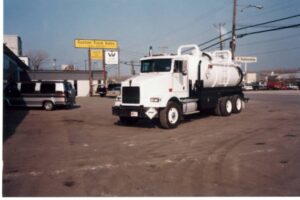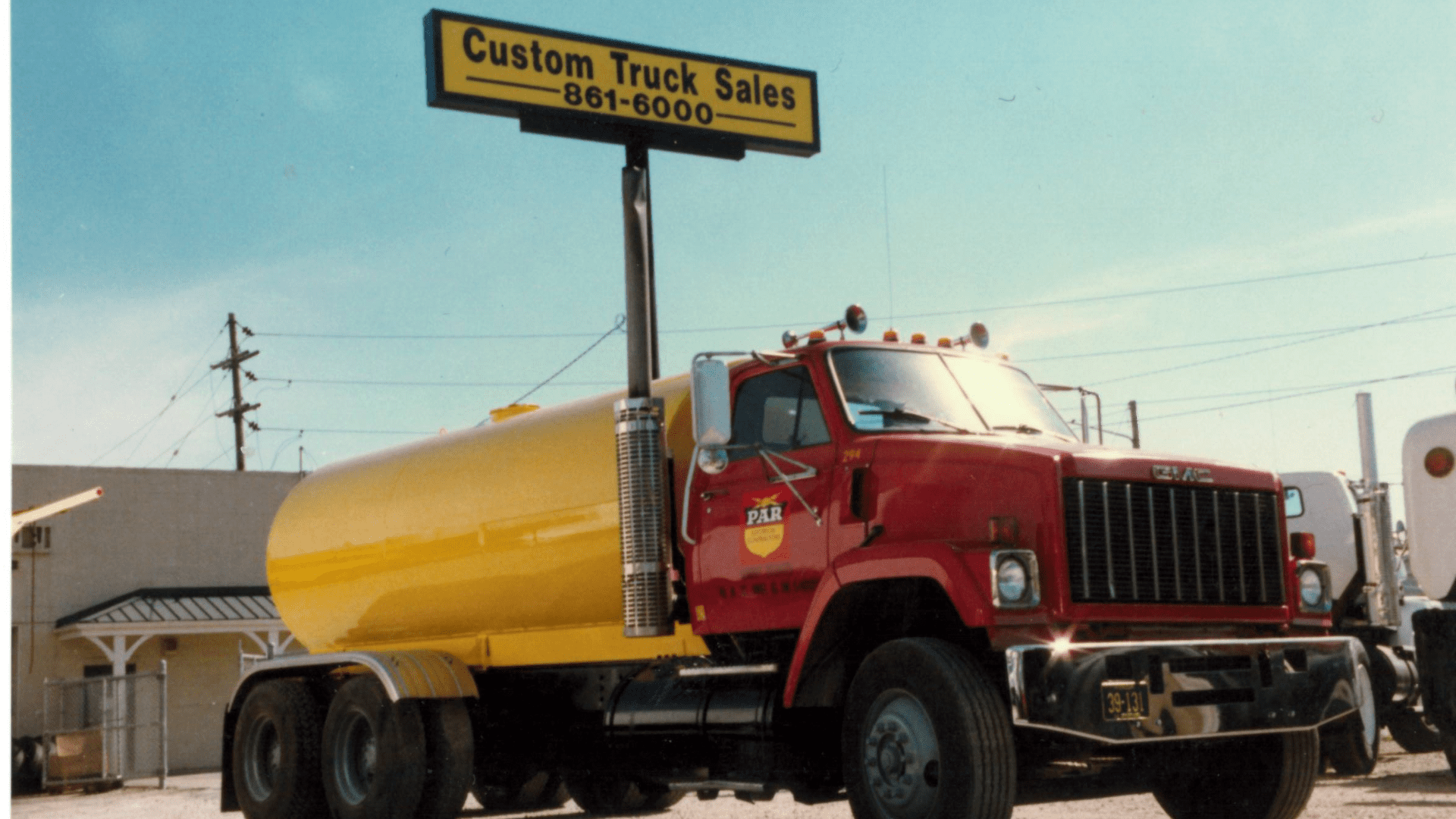
Table of Contents
- The Vision That Started It All
- The Early Days: When Big Dreams Meet Small Shops (1996-1999)
- Necessity Ignites Innovation (2000-2004)
- Growing Through Strategic Partnerships and Market Adaptation (2005-2009)
- Pioneering New Technologies and Markets (2010-2014)
- Strategic Partnerships and Unprecedented Growth (2015-2017)
- Breaking Boundaries and Building Resilience (2018-2020)
- The Merger That Changed Everything (2021-2022)
- Leadership Evolution and Innovation Focus (2023-2025)
- More Than Just Growth: A Story of American Innovation
Picture this: Nine siblings sitting around a table in Kansas City, Missouri, in 1996, sketching out plans for what would become one of the most improbable success stories in American business.
Fred Ross and his eight brothers and sisters had a deceptively simple idea: build better custom trucks for the contractors and utility companies who use them.
The family members soon started a three-bay facility in Kansas City’s Historic Northeast neighborhood.
Fast forward through about three decades of explosive growth to the current Custom Truck One Source (CTOS), a billion-dollar powerhouse with over 2,600 workers spread across 40 locations from coast to coast.
Fred and the Ross family didn’t just ride a wave of heavy equipment industry growth to get big. CTOS helped create the wave.
Anyone who’s spent time in the specialized equipment world knows that most companies either stay small or get swallowed up by bigger players. CTOS somehow managed to thread the needle, scaling from mom-and-pop to major league while keeping the innovation and customer focus that made them special in the first place.
The Vision That Started It All
The story begins in Kansas City, where Fred Ross saw an opportunity in the specialized truck market that others had overlooked. Working alongside his siblings, Ross understood that contractors and utility companies needed more than just standard trucks – they needed customized solutions that could handle the unique demands of their work. From that three-bay shop, Custom Truck Sales was born with a mission to provide exactly that.
What set the Ross family apart from the beginning was their understanding that this wasn’t just about selling trucks; it was about solving problems. Every custom build, every modification, every client relationship was an opportunity to innovate and improve. This philosophy would become the cornerstone of everything CTOS would achieve over the next three decades.
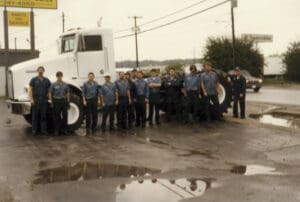
The Early Days: When Big Dreams Meet Small Shops (1996-1999)
The Ross family had something most entrepreneurs lack: the ability to think big while staying grounded. Sure, the family wanted to build a trucking empire, but they started focusing on what contractors needed, in lieu of what looked good in a catalog.
By 1997, just 12 months after opening their doors, the Rosses pulled off something that should have been impossible for a startup. They landed the largest pre-owned truck deal in U.S. history – over 10,000 trucks for Viking Transport, with upfitting work spread across 17 locations nationwide. Most established companies would have choked on an order of that size.
What’s really telling about those early years isn’t just the numbers (though growing from 12 to 75 employees in three years is no small feat). It’s how CTOS built relationships with industry heavyweights like Terex RO, National Crane, and Manitex. These weren’t just supplier agreements, but partnerships that would define the company’s trajectory for decades.
Smart money would have bet against a family operation from Kansas City convincing major electric utility contractors like MYR, PAR, and Sturgeon Electric to trust them with their fleets. But that’s exactly what happened because the Ross family understood something their competitors missed: in the specialized equipment world, relationships matter the most.
Necessity Ignites Innovation (2000-2004)
The early 2000s taught CTOS a lesson that would serve management well for decades: sometimes your biggest innovations come from the most challenging situations.
Take 2000, when CTOS mounted then the nation’s largest tractor-mounted boom for Clarkson Construction. That wasn’t just showing off – it was proof that when contractors had problems nobody else could solve, CTOS would figure it out. By 2002, the firm was the largest boom truck provider in America, a feat managed during a truck-market recession that was crushing other manufacturers.
In 2003, Fred Ross bought out his business partners and made Custom Truck and Equipment a purely family-owned operation. Most business advisors likely called this a financial mistake during a recession. Instead, it freed up Ross to make the kind of long-term bets that public companies and outside investors usually avoid.
The payoff came in 2004 with what might have been Fred Ross’s greatest contribution to the industry. Working closely with contractor clients, he completely reimagined boom truck design, creating what became the modern boom truck standard. Contractors across the country started deploying these new designs because they worked better on real job sites; not because they looked prettier in trade magazines.
This wasn’t just product development; it was customer development. Ross understood that the best innovations come from listening to the people who actually use your equipment, not from engineering teams working in isolation.
Growing Through Strategic Partnerships and Market Adaptation (2005-2009)
The mid-2000s marked a period of dramatic expansion and strategic positioning for CTOS. In 2005, the company made a move that would define its physical presence for decades to come: relocating to a 17-acre facility built atop the historic Armco Steel plant in Kansas City. This wasn’t just a change of address; it was a statement about their manufacturing ambitions and their commitment to the Kansas City community.
A partnership with Iowa Mold Tooling (IMT) proved transformative, with CTOS quickly becoming IMT’s top dealer, adding knuckle booms, mechanics bodies, and drywall loaders models to its portfolio. By 2006, the CTOS headquarters grew to 35 acres, and the company achieved certified body builder status with Ford, adding to its existing relationships with industry leaders like Kenworth, Western Star, Volvo, Freightliner, and Peterbilt.
The specialized rental fleet’s launch in 2007 represented another strategic evolution. Equipped with seasoned rental experts and state-of-the-art facilities, CTOS recognized that many customers needed flexible access to specialized equipment without the commitment to purchase. This pivot to rental services proved prescient as economic challenges loomed.
The Great Recession of 2008-2009 tested every aspect of the CTOS business model. While many companies contracted or failed, the firm demonstrated the resilience built into its foundation. The company pivoted focus to customer-centric rental offerings and revived the pre-owned customization services that was core to their business since 1996.
Perhaps most remarkably, during this challenging period, CTOS became a national remarketer for more than 10 banking institutions and began selling over 2,000 used vocational units annually. This diversification not only helped them survive the recession but positioned them for explosive growth when the economy recovered.
Pioneering New Technologies and Markets (2010-2014)
The 2010s began a period of unprecedented innovation and expansion for CTOS. As the economy recovered, the company leveraged its strengthened position to pursue aggressive growth strategies. Its geographic footprint expanded across multiple states, with new locations in Texas, Wisconsin, Colorado, and Ohio, each chosen for strategic market access and customer proximity.
The company’s commitment to innovation reached new heights in 2013, with the invention of the CTrac8000, the industry’s first customizable high-payload, low-ground-pressure track vehicle. Unveiled at the ICUEE (Utility Expo) show in Louisville, Kentucky, this innovation demonstrates Custom Truck’s ability to create entirely new categories of equipment to meet evolving customer needs.
That same year, in partnership with Elliott Equipment, they co-developed the E160, which became the tallest aerial device in North America. This achievement earned recognition in Construction Equipment Magazine‘s Top 100, cementing CTOS’s reputation as an industry innovator. The E160 wasn’t just tall; it incorporated innovative features that set new standards for aerial equipment performance and safety.
The formation of a dedicated rail division in 2014 displayed CTOS’s strategic thinking about market specialization. Instead of trying to broadly tackle the market, management identified the unique needs of railroad equipment clients and created focused expertise to serve them. This approach – deep specialization combined with broad capabilities – became a hallmark of the CTOS strategy.
By 2014, the Kansas City headquarters had expanded to encompass 60 acres, and they had grown to 450 employees across eight locations. But the most significant changes were yet to come.
Strategic Partnerships and Unprecedented Growth (2015-2017)
A partnership with private-equity firm Blackstone Group in 2015 marked a turning point in CTOS’s evolution. Blackstone took a 70% ownership stake, giving CTOS access to capital and expertise that would fuel an unprecedented acquisition and expansion strategy. The acquisition of four equipment outfitters: Utility Fleet Sales (TX), UCO Equipment (AR), TNT Equipment (NJ), and Forestry Equipment of Virginia (VA) expanded their presence across utility, forestry, rail, and oilfield markets while establishing facilities across the United States.
Rebranding to Utility One Source reflected the company’s broader mission and expanded capabilities. But perhaps the most significant acquisition during this period was Load King, the iconic manufacturer of high-quality trailers. This acquisition brought CTOS full vertical integration in trailer manufacturing, adding a 65-year-old company with deep expertise and established customer relationships.
Innovation continued at a rapid pace. The introduction of a 24/7 Customer Information Center (CIC) created the industry’s first proprietary technician-manned, around-the-clock aftermarket customer support center. This wasn’t just customer service; it was a competitive advantage that set new standards for industry support.
The expansion of Load King’s manufacturing portfolio beyond trailers to include roofing conveyors, water trucks, and dump bodies showed how acquisitions could create synergies and new market opportunities. By 2017, the company launched Custom Truck Capital for in-house financing and Custom Truck Auctions for asset disposal, creating a complete ecosystem of equipment services.
Expansion into Canada kicked off global ambitions, while the Kansas City headquarters continued growing, to 120 acres. The Union Grove, Wisconsin, location added a new 50,000 square foot facility, and by 2017, CTOS operated 21 locations with 1,100 employees.
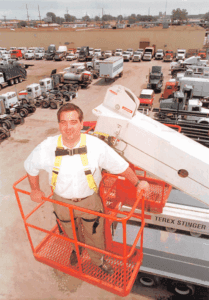
Breaking Boundaries and Building Resilience (2018-2020)
The acquisition of Great Pacific Equipment in 2018 established the firm’s West Coast presence, adding facilities in Fontana and Bakersfield, California. More importantly, CTOS continued expanding its Missouri-based production capacity with two new large-scale, state-of-the-art facilities: one at 110,000 square feet, in Kansas City, and another, 28,000-square-foot shop in Sedalia.
Industry recognition during this period validated CTOS’s innovation efforts. Load King’s 60-Ton Signature Series lowboy trailer and the Voyager series service/mechanics truck bodies both earned Top 100 Awards from Construction Equipment Magazine. Local recognition through Kansas City Business Journal‘s Capstone Award, and a Champions of Business Award showed the company’s importance to the regional economy.
Surpassing $1 billion in annual revenues, a milestone hit in 2019, was a remarkable feat for a company that had started with 12 employees just 23 years earlier. Continued industry recognition and local honors accompanied this achievement, including recognition as the 11th Fastest Growing Business in Kansas City by Ingram’s magazine.
Then came 2020 and the COVID-19 pandemic, presenting challenges unlike anything the economy had faced. Travel restrictions, supply chain disruptions, and labor shortages affected every aspect of business. However, CTOS’s vertically integrated supply chain with Load King and its agile digital customer offerings allowed the company to not just survive but thrive, maintaining billion-dollar revenue status despite the global economic disruption.
The introduction of the Load King Stinger 80-160 during this challenging period demonstrated a continued commitment to innovation even in the face of unprecedented obstacles. The company’s ability to maintain growth and innovation during the pandemic showcased the resilience built into the business model over more than two decades.
The Merger That Changed Everything (2021-2022)
A partnership with Platinum Equity and merger with NESCO Specialty Rentals in 2021 represented the most significant transformation in CTOS history. This wasn’t just an acquisition, it was a strategic merger that doubled the rental fleet, added 11 locations and over 300 employees, and expanded aftermarket offerings, including specialty tools and safety gear for utility workers.
The merger created Custom Truck One Source, a name that reflected its comprehensive approach to equipment solutions. The integration of NESCO’s specialized rental expertise with Custom Truck’s manufacturing and customization capabilities created a unique value proposition in the market.
The timing was particularly meaningful, as 2021 marked the company’s 25th anniversary alongside Load King’s 65th anniversary. This celebration of milestones represented not just longevity but the successful integration of acquired companies into a cohesive, growing enterprise.
The continued investment in digital solutions during 2022 displayed commitment to exceeding evolving customer expectations. The launch of digital portals Custom Truck Auctions and Custom Truck Marketplace demonstrated an understanding that modern equipment management requires digital tools and online accessibility.
CTOS’s rail rental offerings, and Canadian presence, expanded through the acquisition of Hi-Rail Leasing and its two facilities, showing how strategic acquisitions could strengthen existing market positions, while opening new opportunities.
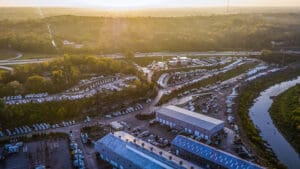
Leadership Evolution and Innovation Focus (2023-2025)
Leadership transition in 2023 marked a new chapter in the CTOS story. Fred Ross’s decision to transition from the CEO role into a Founder position, with Ryan McMonagle taking over as CEO, represented a thoughtful succession plan that honored the company’s heritage, while embracing future opportunities.
The focus on electric equipment innovations during this period positioned CTOS at the forefront of industry sustainability trends. Exclusive vocational EV configurations through partnerships with Battle Motors and Peterbilt, combined with the Load King Lightning PTO electric system, demonstrated a commitment to environmental responsibility, while maintaining performance standards.
The Load King Lightning PTO represented a particularly innovative solution, powering hydraulics needed to operate utility equipment while decreasing engine run-time, lowering diesel emissions, and providing real-time analytics for energy savings and equipment performance monitoring.
Continued growth through acquisitions of Fleet Services, LLC, and A&D Maintenance and Repair, added facilities in Wyandanch, New York and Alexandria, Louisiana, while expansion into new markets including Phoenix, Sacramento, Salt Lake City, and Portland, Oregon showed a continued geographic growth strategy.
The renovation of a 220,000-square-foot warehouse on the headquarters campus, adding new capabilities in fabrication, manufacturing, paint and powder coating, as well as parts operations, demonstrated further commitment to operational excellence and capacity expansion.
A new e-commerce platform launched in 2025 made aftermarket parts more accessible to customers, while Load King’s introduction of the Outback series of easement-focused buckets and digger derricks at Utility Expo 2025 showed CTOS’s continued innovation in specialized equipment solutions.
More Than Just Growth: A Story of American Innovation
The transformation of CTOS from a three-bay shop to a billion-dollar enterprise with over 2,600 employees and 40 locations represents more than exceptional business growth. The company’s journey serves as a testament to the power of American entrepreneurship, the importance of continuous innovation, and the value of building strong customer relationships.
The Ross family’s journey illustrates how a clear vision, combined with willingness to adapt and evolve, can create lasting success. From Fred Ross’s early innovations in boom truck design to the company’s current leadership in electric equipment solutions, CTOS has consistently anticipated market needs and developed solutions that drive industry progress.
The company’s resilience through multiple economic challenges – the early 2000s recession, the Great Recession, and the COVID-19 pandemic – demonstrates the strength that comes from diversified operations, strong customer relationships, and a culture of innovation. Each challenge became an opportunity to strengthen the company’s market position and expand its capabilities.
Perhaps most remarkably, CTOS has maintained its commitment to quality and customer service throughout dramatic growth. The 24/7 Customer Information Center, comprehensive digital platforms, and continued investment in state-of-the-art facilities show that growth hasn’t come at the expense of customer experience.
The company’s evolution from Custom Truck Sales to Custom Truck and Equipment to Custom Truck One Source reflects an expanding mission. The organization is no longer just a custom truck company; it has become a comprehensive equipment solutions provider serving customers across North America with everything from initial equipment design to financing, rental, maintenance, and disposal.
Looking forward, CTOS appears well-positioned for continued growth and innovation. The company’s investments in electric equipment technology, digital customer solutions, and expanded manufacturing capabilities suggest leadership understands the trends shaping the industry’s future. The leadership transition to Ryan McMonagle ensures continuity while bringing fresh perspectives to guide the company’s next chapter.
The story of CTOS is ultimately about the American dream realized through hard work, innovation, and strategic thinking. From eight siblings gathered around a table in Kansas City to a billion-dollar enterprise serving customers across North America, the company’s journey inspires and demonstrates what’s possible when vision meets execution.
As CTOS continues to grow and evolve, the organization carries forward the values and vision that Fred Ross and his siblings established in that three-bay shop nearly 30 years ago. The company’s commitment to solving customer problems through innovation, quality, and service remains unchanged, even as capabilities and reach have expanded exponentially.
The CTOS story represents more than a business success; it stands as a testament to the enduring power of American entrepreneurship and the impact that one family’s vision can have on an entire industry. CTOS has not just grown with its market – the company has helped create and shape it, setting standards for innovation, service, and excellence that benefit customers across the specialized equipment industry.
The next chapter of the company’s story is being written every day, with innovation, new locations, and new customer relationships. If the first 30 years are any indication, the future holds even greater achievements for CTOS and the industries they serve.


